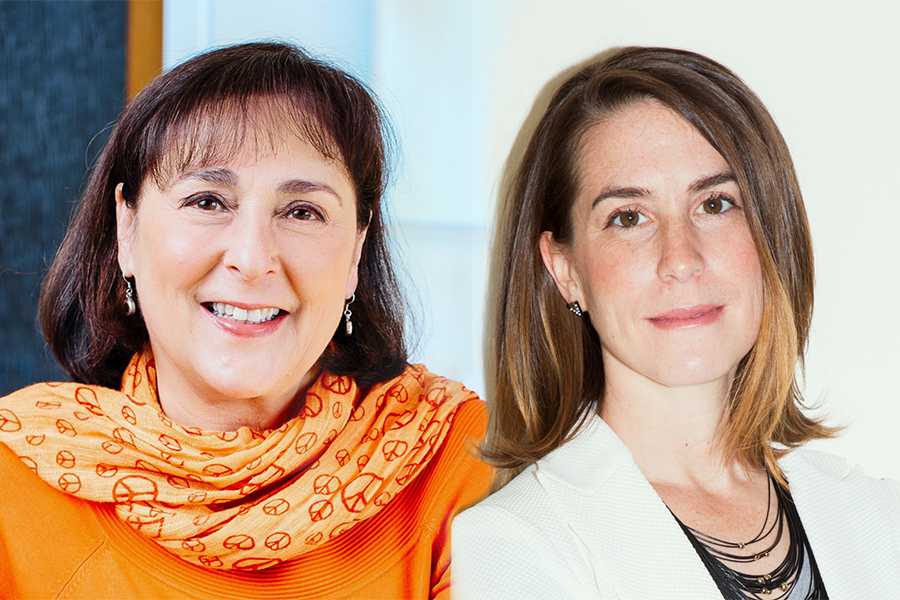
Breaking Barriers
By Joyce DeFrancesco
CMU alumnae explore the ways that gender can make a difference when pursuing entrepreneurial dreams
Cindy Padnos (TPR 1980) and Shanna Tellerman (A 2003, CMU 2005) are textbook examples of how networking and mentorship can change lives.
Cindy, who earned her master’s in industrial administration from the Tepper School of Business, is the founder and managing partner of Illuminate Ventures, an early-stage venture capital firm that invests exclusively in enterprise/B2B software startups. Some of her success stories include Xactly Corporation (acquired by Vista Capital after a successful IPO), Opsmatic (acquired by New Relic) and Sense Platform (acquired by Cloudera) — and her relationship with Shanna.
Shanna is the founder and CEO of Modsy, an online interior design service. She began her entrepreneurial pursuits while in grad school at Carnegie Mellon, where she earned both a BFA and a master’s in entertainment technology, with Sim Ops Studios, a CMU spin-off that focused on democratizing 3-D game development.
An attorney in the Bay area, who was with a firm headquartered in Pittsburgh, first brought Shanna’s startup to Cindy’s attention and asked if she would be willing to share some advice with Shanna. At the time, Cindy was an advisory board member for both CMU’s Project Olympus and the Don Jones Center for Entrepreneurship (now the Swartz Center for Entrepreneurship) and, as a prior software company founder/CEO herself, she had a keen interest in accelerating women tech entrepreneurs.
“It seemed like a natural fit!” Cindy said. “Shanna and I hit it off from the very first meeting.”
A relationship bloomed that has had a lasting impact on both their careers. Cindy became an investor in Sim Ops and Shanna spent a few years in the VC sector before launching Modsy. Shanna currently serves on Illuminate’s advisory board, and together they have collaborated on an annual event in that brings female investors and entrepreneurs together.
Cindy recently sat down with us to answer our questions about the unexpected and frequently unintended barriers gender can throw in the path of a budding entrepreneur.
Q: What inspired you to invest in Shanna?
A: Shanna and her team had a unique product idea that was targeting a very large market opportunity. The makeup of the team was also unusual — with technical talent out of CMU’s Entertainment Technology Center and others with relevant domain knowledge. Plus, the team had been incredibly scrappy, operating on a shoestring to build their web-embedded 3-D development platform and gaining some early customer traction. Shanna definitely showed the kind of leadership that is needed to build a successful business.
Q: What led Illuminate Ventures’ white paper on gender differences in entrepreneurship?
A: I have been a longstanding advocate of expanding diversity in the tech sector. We were already doing this quite successfully in our firm and portfolio, but felt the need to share our learnings more broadly in the hopes of educating others about the opportunity With help from Tepper students we developed a white paper focused on documenting the growth in the talent pool of women founders and their high ratio of success when funded. We followed that with additional research in 2018 because we simply could not understand why, based on our prior research of nearly 10 years earlier, the numbers of VC-backed companies led by women were growing so slowly. The goal was to identify any hidden barriers and share what we learned broadly. We learned a great deal, including uncovering significant unintentional biases in terms of how investors attribute success factors and barriers to entrepreneurs, based solely on their gender. Much of what we learned was a surprise, even for someone like me who has been both a founder and a VC.
Q: What are the takeaways you hope viewers will gain from attending your webinar?
A: While it’s challenging for anyone to be an entrepreneur, it’s a great time to decide to be one. That said, there are proactive steps entrepreneurs can take to increase their odds of success in building a company or raising capital from VCs by knowing how they think. Men and women each have opportunities to put their best foot forward, but where they need to focus is slightly different. Like it or not, investors all have unintentional biases that are based on the gender of founders, among other factors. For investors, I hope they come away realizing that they can make much better investment choices by being aware of the misunderstanding they likely have regarding the barriers that impact entrepreneurs and which success attributes are really part of a founder’s DNA.